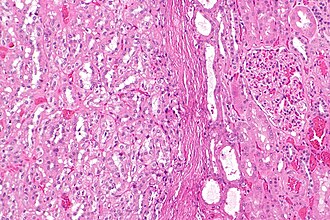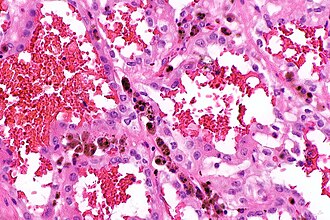Difference between revisions of "Birt–Hogg–Dubé syndrome"
Jump to navigation
Jump to search
(create) |
m (→Features) |
||
| (11 intermediate revisions by the same user not shown) | |||
| Line 1: | Line 1: | ||
[[Image:Unclassified renal cell carcinoma in BHD -- intermed mag.jpg | thumb|right|[[Renal cell carcinoma, unclassified]] in a case of Birt–Hogg–Dubé syndrome. [[H&E stain]]. (WC)]] | |||
[[Image:Unclassified renal cell carcinoma in BHD - b -- high mag.jpg | thumb|right|[[Renal cell carcinoma, unclassified]] in a case of Birt–Hogg–Dubé syndrome. [[H&E stain]]. (WC)]] | |||
'''Birt–Hogg–Dubé syndrome''', also '''Hornstein-Birt-Hogg-Dubé syndrome''',<ref name=pmid22581760>{{Cite journal | last1 = Happle | first1 = R. | title = Hornstein-Birt-Hogg-Dubé syndrome: a renaming and reconsideration. | journal = Am J Med Genet A | volume = 158A | issue = 6 | pages = 1247-51 | month = Jun | year = 2012 | doi = 10.1002/ajmg.a.35330 | PMID = 22581760 }}</ref> is constellation of findings due to a FLCN (folliculin) gene mutation.<ref name=omim135150>{{OMIM|135150}}</ref> It is abbreviated '''BHD syndrome'''. | '''Birt–Hogg–Dubé syndrome''', also '''Hornstein-Birt-Hogg-Dubé syndrome''',<ref name=pmid22581760>{{Cite journal | last1 = Happle | first1 = R. | title = Hornstein-Birt-Hogg-Dubé syndrome: a renaming and reconsideration. | journal = Am J Med Genet A | volume = 158A | issue = 6 | pages = 1247-51 | month = Jun | year = 2012 | doi = 10.1002/ajmg.a.35330 | PMID = 22581760 }}</ref> is constellation of findings due to a FLCN (folliculin) gene mutation.<ref name=omim135150>{{OMIM|135150}}</ref> It is abbreviated '''BHD syndrome'''. | ||
==Features== | |||
* Skin lesions ( | BHD syndrome is characterized by:<ref name=Ref_WMSP290>{{Ref WMSP|290}}</ref><ref name=pmid27220747>{{Cite journal | last1 = Furuya | first1 = M. | last2 = Yao | first2 = M. | last3 = Tanaka | first3 = R. | last4 = Nagashima | first4 = Y. | last5 = Kuroda | first5 = N. | last6 = Hasumi | first6 = H. | last7 = Baba | first7 = M. | last8 = Matsushima | first8 = J. | last9 = Nomura | first9 = F. | title = Genetic, epidemiologic and clinicopathologic studies of Japanese Asian patients with Birt-Hogg-Dubé syndrome. | journal = Clin Genet | volume = 90 | issue = 5 | pages = 403-412 | month = Nov | year = 2016 | doi = 10.1111/cge.12807 | PMID = 27220747 }}</ref> | ||
* Renal tumours | * Skin lesions of face, neck and anterior trunk (~80% of individuals with syndrome): | ||
** | **Fibrofolliculoma. | ||
**Trichodiscoma. | |||
**[[Acrochordon]]. | |||
* Renal tumours (~25-35% of individuals): | |||
**[[Chromophobe renal cell carcinoma]] - most common. | |||
**[[Renal oncocytoma]]. | |||
**[[Renal hybrid oncocytic/chromophobe tumour]].<ref name=pmid23740406>{{Cite journal | last1 = Hes | first1 = O. | last2 = Petersson | first2 = F. | last3 = Kuroda | first3 = N. | last4 = Hora | first4 = M. | last5 = Michal | first5 = M. | title = Renal hybrid oncocytic/chromophobe tumors - a review. | journal = Histol Histopathol | volume = 28 | issue = 10 | pages = 1257-64 | month = Oct | year = 2013 | doi = | PMID = 23740406 }}</ref> | |||
**[[Renal cell carcinoma, unclassified]]. | |||
* Variable penetrance (autosomal dominant). | * Variable penetrance (autosomal dominant). | ||
* Lung cysts - inferior to carina (~80% of individuals with syndrome). | |||
**Multiple basal lung cysts - may be significant.<ref name=pmid26603437>{{Cite journal | last1 = Johannesma | first1 = PC. | last2 = Houweling | first2 = AC. | last3 = Menko | first3 = FH. | last4 = van de Beek | first4 = I. | last5 = Reinhard | first5 = R. | last6 = Gille | first6 = JJ. | last7 = van Waesberghe | first7 = JT. | last8 = Thunnissen | first8 = E. | last9 = Starink | first9 = TM. | title = Are lung cysts in renal cell cancer (RCC) patients an indication for FLCN mutation analysis? | journal = Fam Cancer | volume = 15 | issue = 2 | pages = 297-300 | month = Apr | year = 2016 | doi = 10.1007/s10689-015-9853-5 | PMID = 26603437 }}</ref> | |||
**[[Spontaneous pneumothorax]] (~25% of individuals with syndrome).<ref name=pmid27220747/> | |||
Note: | |||
*May be seen with a mix of oncocytic renal tumours - known as ''[[renal oncocytosis]]''. | |||
==See also== | ==See also== | ||
*[[Hereditary renal cell carcinoma]]. | *[[Hereditary renal cell carcinoma]]. | ||
**[[Von Hippel-Lindau syndrome]]. | |||
**[[Tuberous sclerosis-associated renal cell carcinoma]]. | |||
==References== | ==References== | ||
Latest revision as of 04:40, 19 November 2017
Birt–Hogg–Dubé syndrome, also Hornstein-Birt-Hogg-Dubé syndrome,[1] is constellation of findings due to a FLCN (folliculin) gene mutation.[2] It is abbreviated BHD syndrome.
Features
BHD syndrome is characterized by:[3][4]
- Skin lesions of face, neck and anterior trunk (~80% of individuals with syndrome):
- Fibrofolliculoma.
- Trichodiscoma.
- Acrochordon.
- Renal tumours (~25-35% of individuals):
- Variable penetrance (autosomal dominant).
- Lung cysts - inferior to carina (~80% of individuals with syndrome).
- Multiple basal lung cysts - may be significant.[6]
- Spontaneous pneumothorax (~25% of individuals with syndrome).[4]
Note:
- May be seen with a mix of oncocytic renal tumours - known as renal oncocytosis.
See also
References
- ↑ Happle, R. (Jun 2012). "Hornstein-Birt-Hogg-Dubé syndrome: a renaming and reconsideration.". Am J Med Genet A 158A (6): 1247-51. doi:10.1002/ajmg.a.35330. PMID 22581760.
- ↑ Online 'Mendelian Inheritance in Man' (OMIM) 135150
- ↑ Humphrey, Peter A; Dehner, Louis P; Pfeifer, John D (2008). The Washington Manual of Surgical Pathology (1st ed.). Lippincott Williams & Wilkins. pp. 290. ISBN 978-0781765275.
- ↑ 4.0 4.1 Furuya, M.; Yao, M.; Tanaka, R.; Nagashima, Y.; Kuroda, N.; Hasumi, H.; Baba, M.; Matsushima, J. et al. (Nov 2016). "Genetic, epidemiologic and clinicopathologic studies of Japanese Asian patients with Birt-Hogg-Dubé syndrome.". Clin Genet 90 (5): 403-412. doi:10.1111/cge.12807. PMID 27220747.
- ↑ Hes, O.; Petersson, F.; Kuroda, N.; Hora, M.; Michal, M. (Oct 2013). "Renal hybrid oncocytic/chromophobe tumors - a review.". Histol Histopathol 28 (10): 1257-64. PMID 23740406.
- ↑ Johannesma, PC.; Houweling, AC.; Menko, FH.; van de Beek, I.; Reinhard, R.; Gille, JJ.; van Waesberghe, JT.; Thunnissen, E. et al. (Apr 2016). "Are lung cysts in renal cell cancer (RCC) patients an indication for FLCN mutation analysis?". Fam Cancer 15 (2): 297-300. doi:10.1007/s10689-015-9853-5. PMID 26603437.

